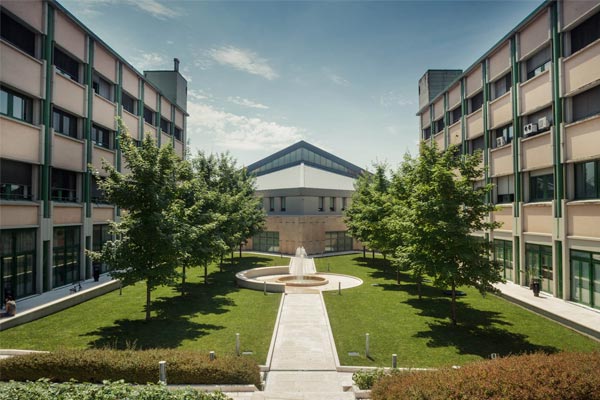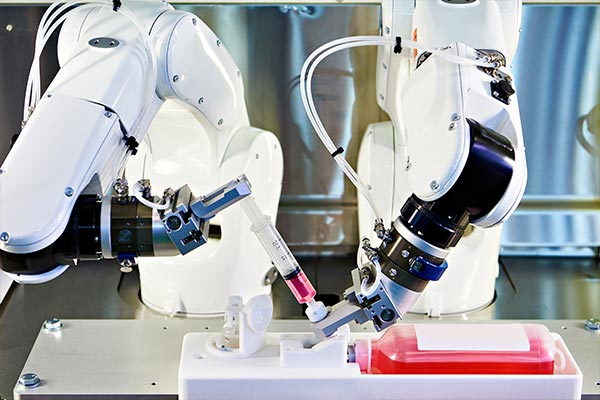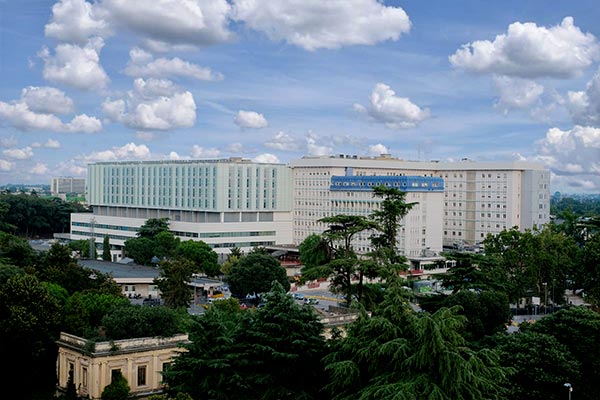Innovative Medicine encompasses all clinical and pre-clinical fields where technological systems play a fundamental role, leading to new devices and methodologies for analysis and treatment.
The Department of Engineering for Innovative Medicine (DIMI) aims at promoting education and research for the design and application of technological systems enabling the field of innovative medicine as well as other synergic sectors.
Designing a system requires integrating technologies (hardware, software, materials and nanomaterials, sensors and actuators, mechanical components) with specific skills and knowledge of the application sector of interest.
The field of innovative medicine is increasingly oriented towards the use of personalized care models relying on precision drugs (Target-Therapy) robotic and intelligent systems. This highlights the potential of establishing valuable synergies with other organizational and industrial sectors, which often lead to a cross-transfer of technologies and solutions.
Clinical interventions and the necessary technologies must be investigated from their theoretical bases to be applied to the specific application sector. Whose theories and methodologies must be revised in the light of new technologies. On the other hand, focusing on spefic application contexst leads to the identification of bottlenacks and open issues shaping new and stimulating design and application challenges.
A department targeting excellence in this field must therefore gather areas of expertise in both innovative medicine and technological areas, particularly engineering and physics, as well as transversal areas of knowledge integration, such as humanities, law and economics.
The department has a strong multidisciplinary vocation, as opposed to the classical division of knowledge into rigid scientific and disciplinary sectors,with the ambition of boosting and coordinating areas bringing complementary and diverse expertises under the same umbrella.
The main areas of interest include:
Biomedical Robotics
This includes multiple applications in the healthcare sector, such as: Service robots that can simplify routine activities for healthcare personnel and guarantee more consistent and well defined processes. Surgical assistance robots that have become increasingly precise and reliable and have entered the surgical field by right, improving 3D vision of the operating field, the safety of the surgical procedure and the results. Rehabilitation assistance robots that can contribute to the rehabilitation of patients with severe neurological and motor deficits.
Precision Medicine
This uses information about a person's genes or proteins to prevent, diagnose, or treat diseases. The aim is to implement preventive, diagnostic and therapeutic approaches that are individualized in terms of time and manner, in order to improve the health of the individual with minimal impact on the healthcare, economic and social system.
Bioengineering
This represents the synthesis of the theoretical and pratical skills necessary for the desing of intelligent systems in the biomedical field, with both translational and technological innovation purposes. The peculiar aspect of bioengineering is the modeling of signals, data and systems, and their analysis using both classical methods, such as statistical analysis, and innovative methods, such as machine and deep learning, which better respond to the current needs of managing large amounts of heterogeneous and multimodal data, including genetic descriptors.
Artificial Intelligence in Medicine
This involves the development of algorithms and artificial intelligence systems applied to medical and surgical sciences. Regenerative Medicine This involves the study of biological mechanisms of tissue degeneration and regeneration, cell and gene therapy, production of biomaterials and bionanotechnologies applied to regenerative medicine. Anti-tumor Immunotherapies These are cellular or antibody-based immunotherapies, based on treatments with immune cells engineered to recognize the tumor as a target, or on antibody recognition of antigens and molecules expressed by the tumor itself (antibodies with single or multiple antigenic specificity), both in hematological and solid tumors
Anti-tumor
Target-therapy This is based on specific inhibitors of intracellular pathways identified through extensive molecular screening of hematological neoplasia and solid tumors, with the development of new personalized therapeutic strategies. Innovation in Clinical and Methodological Research This involves the development of epidemiological studies, development of new molecular target drugs and new personalized therapeutic strategies, telemedicine and management programs for patients with chronic diseases or chronicized diseases.
Ethics and law
Ethics and law study the consequences of new technologies (medical biotecnologies, medical AI) from different perspectives: ethical, juridical, social and political. The main fields of research are safety, risks-benefits assessment, respect of human dignity and rights, juridical responsibility and autonomy of both the new AIs and its human users, and the question of their governance and regulation.








